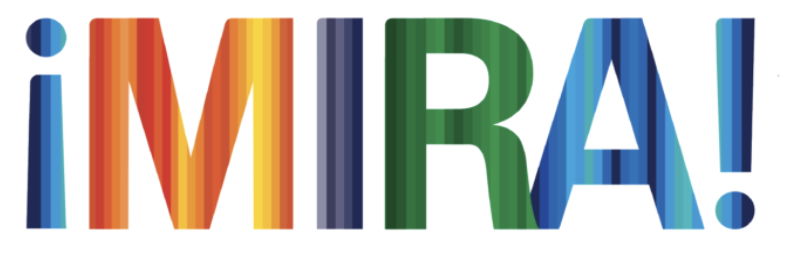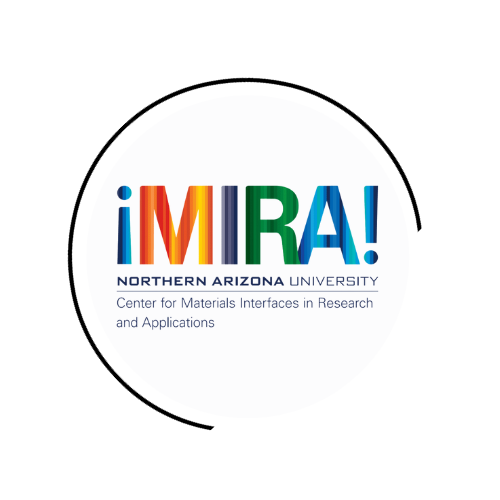Atomic Force Microscopy (AFM) User Facility
About the AFM Lab
Location
SHB – Science and Health Building, Room 005 (700 Osborn Dr, Flagstaff, AZ 86011)
Description
Atomic Force Microscopy (AFM) – a type of scanning probe microscopy – is a tool for imaging, measuring, & manipulating matter at nanoscale. AFM consist of a family of operating modes which monitor the interaction of a very sharp tip and the sample surface.
Equipment
The Scanning Probe Facility at the NAU Center for Materials Interfaces in Research and Applications (¡MIRA!) has state of the art capabilities consisting of two Asylum atomic force microscopes including a stand alone microscope and a Bioscope that consists of MPF-3D coupled with an Olympus IX-83 inverted optical microscope.
Capabilities include standard Atomic Force Microscope, Scanning Force Microscopy, Designer Probe Fabrication for colloidal force spectroscopy electrochemical AFM, etc. The ability to image under environmentally controlled conditions also exists for materials ranging from solid state electronics to biological materials.
Additional information about available equipment and capabilities can be found online.
[accordion]
Asylum MFP-3D Bio

The Asylum Research MFP-3D-BIO sets the standard for integrating AFM and optical microscopy for bioscience research. It is the only bioAFM that makes no compromises to AFM imaging resolution, force measurement performance, or application versatility while seamlessly integrating with a full range of optical techniques. This, along with unmatched support from Asylum experts, make it the best, most productive bioAFM to achieve your research objectives. This instrument is in an acoustic and vibration controlled housing. Quantitative probe calibration is available on this instrument.
Imaging Modes: Tapping Mode, Contact Mode, Force Spectroscopy, Fluorescent Imaging, Phase Contrast Imaging, Quantitative Nanomechanical Measurements, AMFM, Force Modulation, blueDrive photothermal cantilever excitation. Environmental controllers: Imaging in Liquids, controlled humidity environments, and controlled temperature.
[/accordion]
[accordion]
Asylum MFP-3D Infinity

The Asylum Research MFP-3D Infinity is the latest, most advanced AFM in the MFP-3D family. It combines the renowned versatility of its predecessor with new higher performance, powerful new capabilities, and a new system architecture designed for future expansion. The MFP-3D Infinity will make your routine imaging tasks even easier and faster to complete while also supporting your most ambitious research projects. This instrument is in an acoustic and vibration controlled housing. Quantitative probe calibration is available on this instrument.
Imaging Modes: Tapping Mode, Contact Mode, Force Spectroscopy, Quantitative Nanomechanical Measurements, AMFM, Force Modulation, blueDrive photothermal cantilever excitation. Environmental controllers: Imaging in Liquids, controlled humidity environments, and controlled temperature.
[/accordion]
[accordion]
Custom Probe Fabrication

Along with standard AFM probes, our facility is equipped with a micromanipulator stage, capillary puller, and micro-forge for the fabrication of custom AFM cantilever tips/probes. Examples of custom probe development include attachment of single bacterium, pollen capsid, or microspheres to tip-less cantilevers for the characterization of contact mechanics with surfaces/materials. Our facility is also equipped for chemical modification of standard AFM probes such as functionalization with oligomers or peptides for interrogation of binding mechanics.
[/accordion]
Training
Users must be trained to use this facility. Training typically consists of 3-5 (2-hour) sessions with staff.
Session 1: consists of a short overview of AFM principles, with complete instruction on how to obtain an image.
Session 2: consists of guided user operation of equipment following instructions previously provided.
Session 3: consists of independent user operation of equipment with help in addressing common concerns as they arrive. (Subsequent session are reserved for advanced/specific application training.)
Once trained, student may use the lab 24 hours a day, 7 days a week, with the exception of training hours, maintenance, and demonstrations.
Additional training and resources are available online.
Users must complete NAU chemical and biological safety training (nau.bioraft.com).
Rates
Internal $9.75/hour; Internal Assisted $17.50/hour
External $41.42/hour; External Assisted $85.88/hour
[button align=”center”]
[/button]
[departments-embed]

